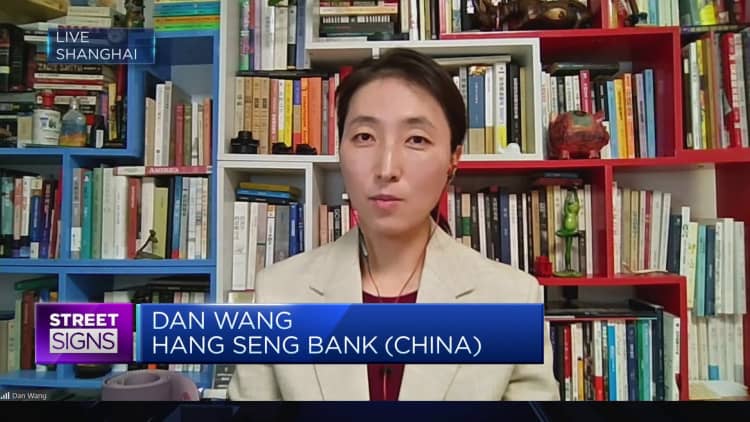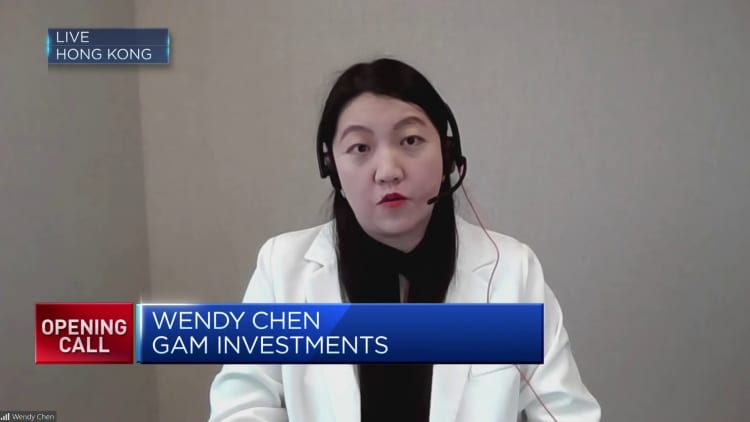China’s central bank governor said there was room to further cut banks’ reserve requirements, and pledged to utilize monetary policy to prop up consumer prices.
Bloomberg | Bloomberg | Getty Images
BEIJING — The heads of China’s central bank and economic planning agency signaled that authorities would be willing to take further steps to support growth, but did not announce any large-scale stimulus plans.
Pan Gongsheng, governor of the People’s Bank of China, told reporters Wednesday there was room to further cut banks’ reserve requirements — the amount of cash they need to have on hand. He also pledged to utilize monetary policy to “mildly” prop up consumer prices, according to CNBC’s translation of his Mandarin-language remarks.
Pan was speaking at a press conference with other key leaders of the country’s economy and financial sector on the sidelines of this year’s annual parliamentary meetings.
The leaders defended China’s growth target of around 5% for the year, while adhering to a 3% fiscal deficit.
In an annual government work report released on Tuesday, Premier Li Qiang promised to transform the world’s second-largest economy, which is facing a slew of economic challenges including a real estate slump, high levels of local government debt, deflation and weak consumer demand.
Yet, the work report fell short of many analysts’ expectations for further stimulus and raised questions about how China would be able to achieve another year of growth that’s around 5%.

National GDP rose by 5.2% in 2023, up from a low base in 2022 as China emerged from its stringent “zero Covid” measures. China’s consumer prices saw their biggest drop in January since 2009, while producer prices declined for a 16th month — underscoring the depth of the challenge that Beijing faces in reflating the world’s second-largest economy.
Still, Pan said China has ample monetary policy tools at its disposal, and pledged to push for lower financing costs in the months ahead.
The PBOC last cut reserve ratio requirements for banks by 50 basis points from Feb. 5, which provided 1 trillion yuan ($139.8 billion) in long-term capital. It was a much larger cut than analysts expected.
Boosting growth
This year, China will “continue to strengthen macroeconomic policies,” said Zheng Shanjie, chairman of the National Development and Reform Commission, the country’s economic planning agency.
He noted how this would involve coordination of fiscal, monetary, employment, industrial and regional policies, as China continues to step up macro economic policy adjustment.
“Of course, we clearly see that in the process of achieving the expected targets, there are still many difficulties and problems,” Zheng said, according to CNBC’s translation of his Mandarin-language remarks.
He noted how the “external environment may become more complex and severe.” Domestically, there may be problems in China’s efforts to remove provincial barriers to doing business by creating a “national unified market,” he added.
Zheng also said there was fierce competition in some industries, production and operating difficulties for certain businesses, as well as persistent risks in other areas. He did not mention real estate by name.
China’s Commerce Minister Wang Wentao said foreign trade faces a severe situation this year.
Zheng, the NDRC chief, said China’s exports for the January-February period increased by 10% from a year ago, but did not specific if this was in Chinese yuan or U.S. dollar terms. The next tranche of trade data is due to be released Thursday.
Bonds, debt and domestic demand
At the press conference, China’s Minister of Finance Lan Fo’an told reporters the local debt situation is “controllable” overall.
He said local government debt levels declined after his ministry’ work last year, and they are working on a longer term mechanism to resolve the issue of hidden bad debts, while seeking to defuse the issue with a range of measures.
The “ultra long” special treasury bonds announced in Tuesday’s government work report was the rare surprise and only the fourth time they have been issued since the 1990s.

NDRC chief Zheng told reporters these bonds will support technological innovation, energy securities and other key areas — which are among President Xi Jinping’s “new productive forces” spelt in the work report.
He also said policy plans for equipment upgrades will help boost consumption in the world’s second largest economy and create a market of more than 5 trillion yuan (about $694.5 billion). He said this plan would include home appliances and vehicles, among others.
China’s economy has been dragged down by lackluster consumption, as the real estate market slump, debt risks and stock market declines weigh on confidence.
Boosting domestic demand is the third-ranked task of the list of 10 economic priorities in the Chinese government’s plan for this year, underscoring the severity of the matter.
For investors in the near term, the primary concern remains how much China’s policymakers are focused on ensuring growth.
“In order to achieve this [target of around 5%], the government work report proposed many major policies,” Huang Shouhong, head of the report’s drafting team and director of the State Council’s research office, told reporters on Tuesday in Mandarin, translated by CNBC.
“If China’s economy encounters unexpected shocks in the future, or the international environment undergoes unexpected changes, we still have tools in reserve in our policy toolbox,” he said.


